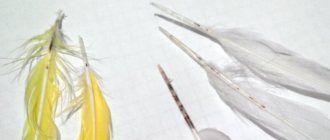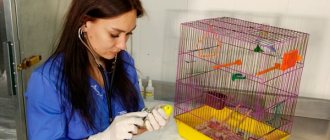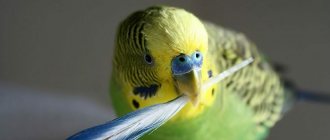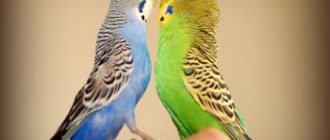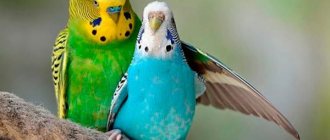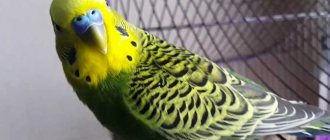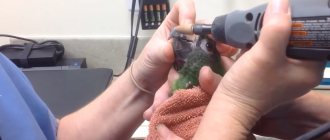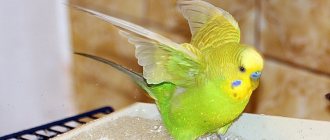The owner of a bird must bear moral responsibility for his pet. It also applies in case the bird is affected by a disease. Therefore, the owner needs to know what diseases affect budgies and how to treat them. This also applies to all other species of parrots. These birds have common diseases.
It must be said right away that budgies get sick quite rarely. But this does not mean that their health does not need to be constantly monitored. After all, the sooner the owner notices the disease in the bird, the easier it will be to treat it.
Appearance of a healthy parrot
A healthy bird is distinguished by the following signs:
- Appetite. She always eats willingly.
- Good plumage condition. Her feathers are shiny and smooth.
- Cheerfulness and activity. This parrot chirps and sings merrily.
- Good dream. It's not protracted. During sleep, the bird usually sits on one leg.
The bird has a cold
If a budgie gets a cold, it usually causes a lot of trouble for the owner. The disease is manifested by sneezing, drowsiness, inflammation of the mucous membranes and heavy breathing.
Budgerigars normally tolerate diseases of the mucous membranes when treatment is carried out promptly and promptly. The bird needs to be warmed, fed with honey and lemon juice. Sometimes it is recommended to inhale with menthol or eucalyptus. To do this, a bowl with a hot broth is placed next to the cage and covered with a cloth. The procedure takes 10–20 minutes. If the bird spreads its wings and breathes heavily, the inhalation time is reduced.
How to tell if your parrot is sick
Any attentive owner, taking a closer look, will immediately determine the painful state of the bird. Sick bird:
- Loses appetite and eats very poorly.
- Falls into a state of apathy.
- Sharply reduces physical activity.
- She breathes completely differently than a healthy person. Her breathing is difficult, rapid and intermittent.
- A sick bird sleeps on two legs and does so longer than a healthy one.
If such signs are present, you need to show the bird to a veterinarian. After all, even an experienced amateur can make a mistake in making a diagnosis.
What droppings and urine tell you
Changed discharge will indicate that the parrot is sick. The normal color of feces is brown or green, or variations of these colors. Parrot droppings have no smell. If you notice severe diarrhea or significant deviations from the norm, take your pet to the doctor.
Warning signs indicating ill health:
- unpleasant smell of feces;
- the presence of liquid, blood, mucus, bubbles;
- presence of undigested food.
There is no need to rush to the doctor if the change in litter is affected by food. You are probably changing the diet or switching the bird to another feed - the color of waste products may differ from the usual. If the bird has a liquid diet, then the droppings may be watery, and this is also normal. If, apart from these symptoms, nothing bothers the parrot and it behaves as usual, then there is no danger.
Parrots' urine is transparent - light or white, sometimes creamy or creamy in color, sometimes it can resemble chalk in color.
Warning signs:
- increased urine volume;
- change in color to green or yellow (except for cases where the color has changed due to food);
- presence of drops of blood.
Causes of diseases
Why does a parrot get sick? An unlucky bird lover sometimes wonders. The answer to this question is that the main cause of disease is inadequate care, namely:
- Using low-quality feed.
- Feeding your pet food that is undesirable for parrots.
- Irregular disinfection.
- Bored content.
- Failure to comply with quarantine measures when purchasing new birds.
The best solution is to follow the rules for keeping parrots at home as much as possible.
How to cure a parrot
Treatment of budgerigars and other parrots can be carried out either independently or in a veterinary clinic. The second option is preferable, especially for severe illnesses.
Vet clinic
Most diseases can be confidently diagnosed only by specialists after conducting an appropriate examination and taking tests. Therefore, the best option would be to go to a veterinary clinic. Specialists who know how to cure a parrot will make a diagnosis and prescribe a treatment algorithm. If necessary, the feathered pet can be left at the clinic for inpatient treatment.
Self-medication
What to do with a parrot if, due to the lack of a veterinary clinic in the locality, you have to treat it at home? In this situation, it is necessary to carefully study the available information about the suspected disease and only then outline a treatment plan. It would be a good idea to consult with a veterinarian online or ask for advice from experienced breeders on a specialized forum.
Common diseases
If your parrot suddenly gets sick, you should be wary. Some diseases can go away on their own, but most can become severe and cause complications. Therefore, the owner must have an idea of what diseases can occur in birds and how to treat budgies.
Cold
It is important to remember that budgies have increased sensitivity to sudden changes in temperature, so even a draft can cause the development of a cold. For this reason, carefully monitor the vents and windows; they must be closed.
How can you determine that a parrot is sick? It is worth carefully examining his appearance; he will look unhealthy and inactive. The bird may sit in one place for a long time, and mucus may be released from its eyes and nose.
If your budgie has a cold, it will exhibit the following symptoms:
- Lethargy;
- Apathy;
- He may sneeze;
- Poor appetite;
- He sleeps constantly;
- The plumage becomes ruffled.
Before starting treatment, the bird must be taken to see a veterinarian. The specialist will conduct the necessary examination and determine the presence of a cold. Based on the data obtained, he will be able to select the appropriate treatment therapy.
At home, you can warm up your feathered pet using a lamp. Additionally, you can perform inhalations using tea tree oil. To improve the condition and speed up recovery, you can add chamomile decoction to the drinking bowl.
Ticks
When studying diseases of parrots, it is worth paying attention to ticks. Parasites often affect birds, they can come from anywhere - from other pets, the owner can bring them on clothes from the street.
When they appear, the bird begins to constantly itch. She experiences severe itching, which bothers her and causes discomfort. When these manifestations appear, it is worth moving the plumage apart; ticks can be found between the feathers. They can also be observed on the paws, near the eyes and beak.
It is important to remember that mites cause serious harm to the health of birds; they can cause the formation of growths on the surface of the paws or beak. Vaseline or vegetable oil works well; it will block the air and the pests will not be able to breathe, as a result they will die. For treatments, you can use aversectin or novertin ointment.
Goiter inflammation
Every owner of feathered pets should remember that many diseases of budgies can occur without any symptoms, so they can be ignored. Goiter inflammation is one of them. This pathological process cannot be detected at the initial stage, so it often develops into a complicated form.
The following factors may cause:
- Various toxic substances that birds can inhale;
- Consumption of low quality feed mixtures;
- Deficiency of useful elements;
- Using dirty water;
- Various complications after infectious diseases.
It is important to first study the symptoms and treatment features of budgerigar disease. Usually, when the goiter is inflamed, the bird does not eat food, it is lethargic, and practically does not drink. Over time, she begins to vomit, which may contain mucus.
Poisoning
Poisoning is a common ailment of birds. They can occur when consuming low-quality feed mixtures and unpurified water. These diseases in budgies can occur due to improper nutrition.
How can you tell if your parrot is sick? The main symptoms of poisoning include:
- The appearance of liquid droppings;
- Severe lethargy;
- Frequent vomiting;
- Poor appetite;
- Drowsiness.
In case of poisoning, the parrot should be given an absorbent. Smecta and Polysorb have a good effect. They are infused into the bird using a syringe. Dairy-free cereals are suitable for feeding. Additionally, it is worth warming your pet; a table lamp is suitable for this.
Paw injuries
Diseases of parrots can be associated with paws, namely with injuries to the limbs. They may experience dislocations, fractures, bruises, and sprains.
If a sick parrot experiences a deterioration in its condition, it is definitely worth taking it to see a veterinarian. He needs to be taken to a specialist urgently if the damaged paw is immobilized, red and swollen. The hospital will perform the necessary examination and select the appropriate treatment.
Vomiting, diarrhea and constipation
The occurrence of vomiting, diarrhea or constipation often occurs in a budgerigar with a poisonous disease. When poisoned, the bird begins to burp frequently after eating food. This may result from the following:
- When overfeeding birds;
- Insufficient supply of useful elements;
- Wrong diet;
- Liver problems;
- Peritonitis;
- Presence of parasitic organisms;
- Toxin poisoning.
Many infections in budgies are accompanied by vomiting and diarrhea. All this quickly leads to dehydration of the bird and subsequent death. In these cases, you should immediately contact a veterinarian; he will be able to save your feathered pet and prescribe effective treatment.
Lipoma
A lipoma is a tumor formation on the abdomen of a bird. It is located in the lower part of the abdomen, but can sometimes occur on other parts of the body. The tumor is benign. You may feel a ball moving under your skin.
If a budgie gets sick with this pathological process, then many owners may have a question - what to do in this situation? How can I help him? You can’t do anything on your own, otherwise you could harm your pet. It is important to visit a veterinarian immediately.
Treatment of this disease in budgies is accompanied by a special diet that is aimed at reducing weight. Lipoma is caused by obesity. The menu should include more cereals, vegetables and herbs. Also, periodically, the pet should be allowed out of the cage to fly.
Inflammation of the cloaca
When studying what ailments parrots have, it is worth paying attention to inflammation of the cloaca. This disease develops as a result of poor nutrition, lack of vitamins, and also when the bird eats difficult-to-digest food. Inflammation can develop due to poor quality cleaning of the feathered pet’s cage.
The following symptoms of the disease are observed in a budgerigar:
- Diarrhea;
- Gluing and clumping of feathers around the cloaca;
- Inflammation of the skin near the cloaca, signs of swelling;
- Significant weight loss;
- Lack of appetite;
- Decreased activity;
- The appearance of blood and mucous discharge.
If symptoms occur, you should contact your veterinarian. Only a doctor can conduct a quality examination and prescribe the necessary examination.
How to give medicine to a bird
There are three ways to introduce medications into a parrot's body. This:
- Injection. The injections must be given by a person with a certain skill.
- Cottage with food. It is quite possible, following the recommended dosage, to inject liquid preparations into berries and fruits intended for the parrot.
- Dacha in the beak. The most complex method, which should only be administered by veterinarians or very experienced breeders. You need to catch the bird, hold it tightly, fixing its head with three fingers. The medicine should be slowly injected from a syringe into the bird's open beak. Often during this procedure, an untrained bird becomes like mad. Therefore, it is better to entrust it to professionals.
Aspergillotoxicosis
It is nothing more than a fungus of the Aspergillus species. These bacteria can be found in dirty cage bedding or in food.
Most often, young chicks suffer from this disease, but adults also have a risk of becoming infected.
If the disease manifests itself in an acute form, then urgent veterinary intervention is necessary.
Otherwise, severe convulsions can lead to the death of the bird.

